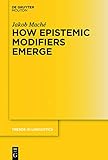How Epistemic Modifiers Emerge / Jakob Maché.
Material type: TextSeries: Trends in Linguistics. Studies and Monographs [TiLSM] ; 292Publisher: Berlin ; Boston : De Gruyter Mouton, [2019]Copyright date: ©2019Description: 1 online resource (XV, 596 p.)Content type:
TextSeries: Trends in Linguistics. Studies and Monographs [TiLSM] ; 292Publisher: Berlin ; Boston : De Gruyter Mouton, [2019]Copyright date: ©2019Description: 1 online resource (XV, 596 p.)Content type: - 9783110400564
- 9783110411126
- 9783110411027
- 400
- online - DeGruyter
- Issued also in print.
| Item type | Current library | Call number | URL | Status | Notes | Barcode | |
|---|---|---|---|---|---|---|---|
 eBook
eBook
|
Biblioteca "Angelicum" Pont. Univ. S.Tommaso d'Aquino Nuvola online | online - DeGruyter (Browse shelf(Opens below)) | Online access | Not for loan (Accesso limitato) | Accesso per gli utenti autorizzati / Access for authorized users | (dgr)9783110411027 |
Frontmatter -- Acknowledgements -- Contents -- List of Tables -- Abbreviations -- 1. Introduction -- 2. Modal verbs: A class struggle -- 3. The nature of epistemic modality -- 4. Twenty-one commandments for epistemic modality -- 5. Reportative and evidential modal operators -- 6. Anchoring the deictic centre -- 7. On black magic: A diachronic explanation -- 8. Summary -- Primary sources -- References -- Author index -- Subject index
restricted access online access with authorization star
http://purl.org/coar/access_right/c_16ec
This book delivers the first comprehensive study on German modal verbs which summarises and critically reflects the discussion of the last 500 years, checks these findings against large corpus data and is accessible to the English reader. It is shown that non-epistemic modal verbs modify events, whereas their epistemic counterparts modify the proposition, and how the latter developed from the former.
Issued also in print.
Mode of access: Internet via World Wide Web.
In English.
Description based on online resource; title from PDF title page (publisher's Web site, viewed 25. Jun 2024)


